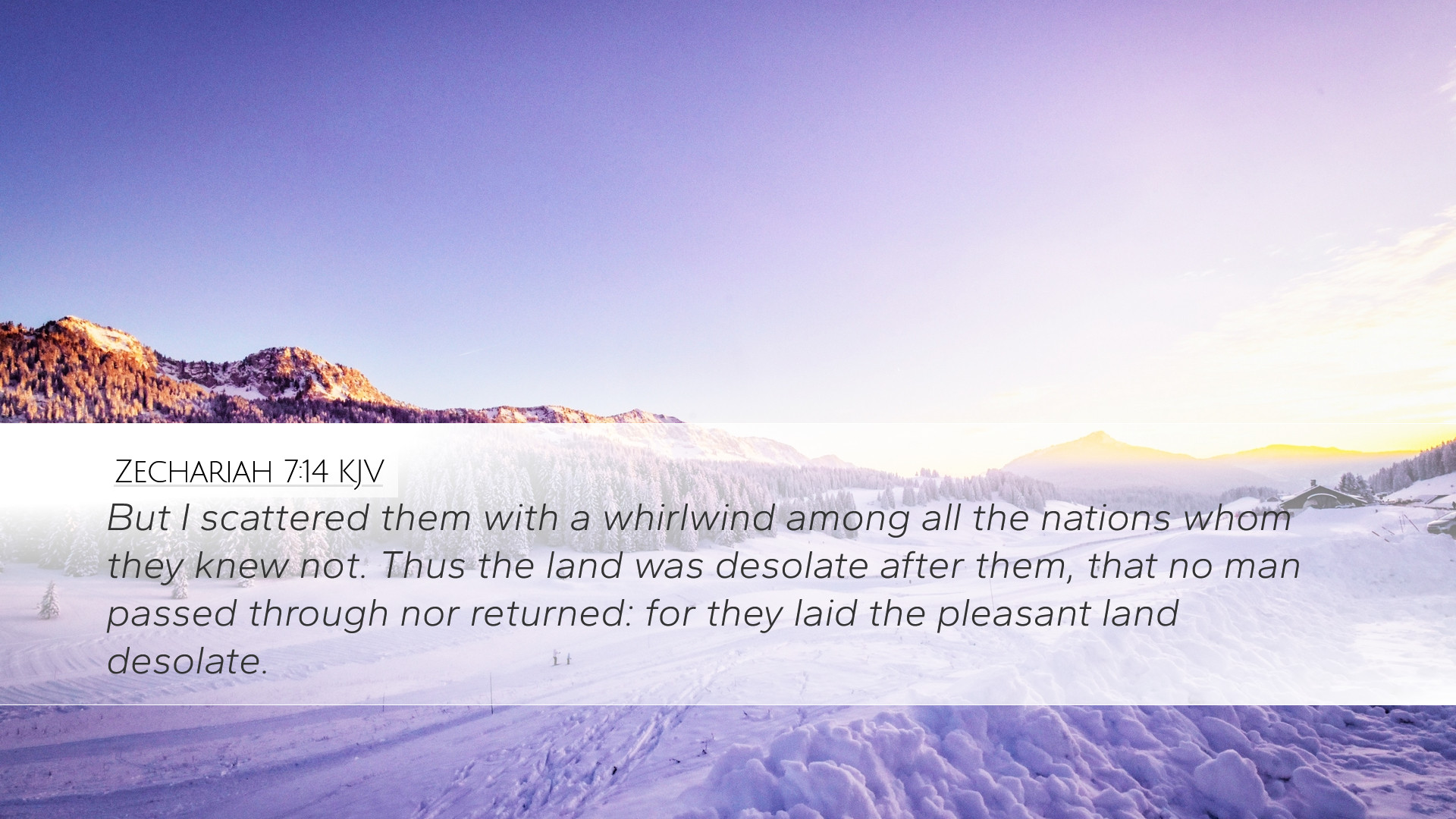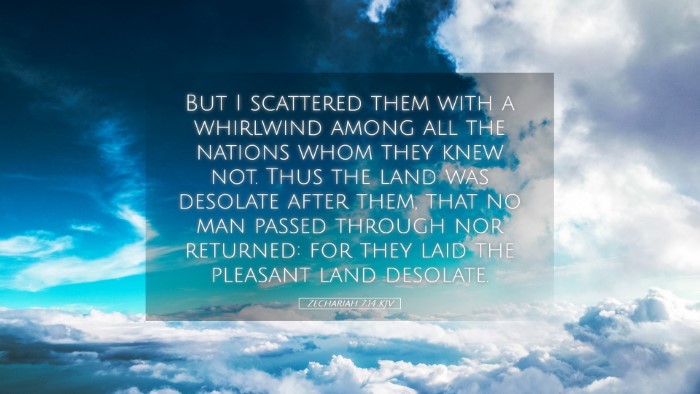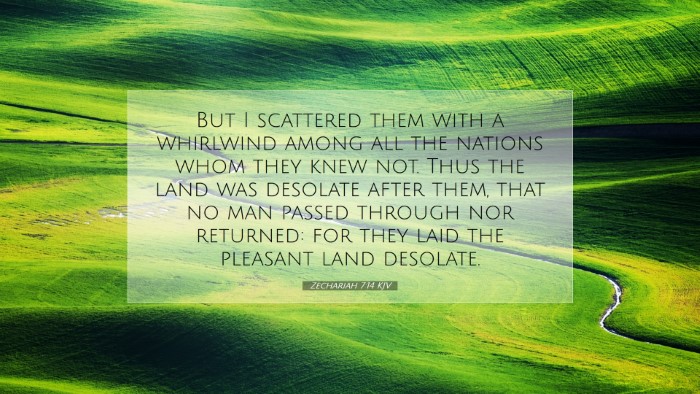Old Testament
Genesis Exodus Leviticus Numbers Deuteronomy Joshua Judges Ruth 1 Samuel 2 Samuel 1 Kings 2 Kings 1 Chronicles 2 Chronicles Ezra Nehemiah Esther Job Psalms Proverbs Ecclesiastes Song of Solomon Isaiah Jeremiah Lamentations Ezekiel Daniel Hosea Joel Amos Obadiah Jonah Micah Nahum Habakkuk Zephaniah Haggai Zechariah MalachiZechariah 7:14
Zechariah 7:14 KJV
But I scattered them with a whirlwind among all the nations whom they knew not. Thus the land was desolate after them, that no man passed through nor returned: for they laid the pleasant land desolate.
Zechariah 7:14 Bible Commentary
Commentary on Zechariah 7:14
Verse: Zechariah 7:14 - "But I scattered them with a whirlwind among all the nations whom they knew not. Thus the land was desolate after them, that no man passed through nor returned: for they laid the pleasant land desolate."
Introduction
This verse stands as a poignant reflection on the consequences of the people's disobedience and rejection of God's commands. As Zechariah speaks to the remnant of Israel, he emphasizes the heavy price of infidelity to God. The insights from public domain commentaries elucidate the theological implications and historical context of this scripture, making it relevant for pastors, students, theologians, and Bible scholars.
Historical Context
In the time of Zechariah, the Israelites were returning from Babylonian exile, a period marked by profound loss and devastation. The land that once flourished became a desolation. Understanding the historical backdrop is crucial, as it reveals the relationship between divine judgment and Israel's idolatry.
Insights from Matthew Henry
Matthew Henry’s commentary underscores the idea of God's sovereign action in scattering His people. He notes that the “whirlwind” symbolizes both divine wrath and the uncontrollable nature of God’s judgment. Henry implies that the scattering was not random but a deliberate act to fulfill God’s righteous anger against a rebellious nation.
Insights from Albert Barnes
Albert Barnes expounds on the phrase “among all the nations whom they knew not.” He interprets this as God's punishment resulting in estrangement; the Israelites found themselves in lands unfamiliar, where their identity and faith were challenged. Barnes highlights that this scattering served a dual purpose: it acted as a corrective measure designed to bring the people back to God while simultaneously demonstrating the futility of turning away from Him.
Insights from Adam Clarke
Adam Clarke adds a nuanced perspective regarding the “pleasant land.” He reflects on the land of Canaan as a gift from God, intended for Israel’s flourishing. Clarke warns that the desolation was not merely physical; it symbolizes spiritual barrenness resulting from disobedience. His commentary invites readers to consider their own spiritual landscapes in light of their relationship with God.
Theological Implications
This verse resonates with several theological principles, primarily concerning the character of God and His dealings with humanity.
- Divine Sovereignty: The scattering of the Israelites illustrates God's ultimate authority over nations and peoples.
- Consequences of Sin: The desolation of the land serves as a stark reminder of the potential consequences of turning away from divine instruction.
- Hope and Restoration: Even amidst judgment, there remains a thread of hope for restoration, reflecting God’s continual desire to reconcile with His people.
Exegesis of Key Themes
The Whirlwind of Judgment
The term “whirlwind” invokes imagery of power and chaos. It signifies how God's judgment can manifest in unexpected and overwhelming ways. The uncontainable nature of a whirlwind also emphasizes the gravity of divine judgment, reinforcing the notion that it is not something to be taken lightly.
Desolation of the Land
The desolation reflects not only physical barrenness but also spiritual desolation. This theme invites believers to introspect on their own lives; how might one’s personal disobedience lead to spiritual desolation? The land being “pleasant” serves as a contrast to its fallen state and underscores the loss that accompanies sin.
Applications for Today's Believers
Zechariah 7:14 serves as a powerful reminder for modern believers to reflect on their relationship with God. The following applications are drawn from the commentary insights:
- Awareness of Consequences: Believers are urged to consider the impact of their choices and actions in light of God’s expectations.
- Encouragement in Desolation: When facing desolation in any form—be it spiritual, physical, or emotional—one should remember that God is always a God of restoration.
- Seeking God’s Guidance: Regular engagement with scripture and prayer can fortify one’s relationship with God, ensuring that the path chosen is aligned with His will.
Conclusion
Zechariah 7:14 profoundly communicates the themes of divine judgment, consequences of sin, and the hope of restoration. Through the insights of respected commentators like Matthew Henry, Albert Barnes, and Adam Clarke, we uncover deeper theological truths that speak to the heart of God's covenant with His people. As pastors, students, theologians, and scholars reflect on this verse, they are invited to consider both the historical implications and its enduring relevance in the faith journey today.


